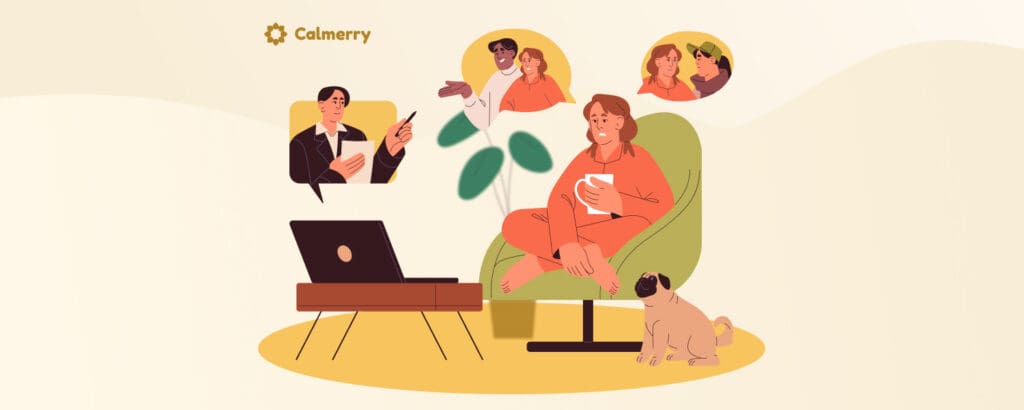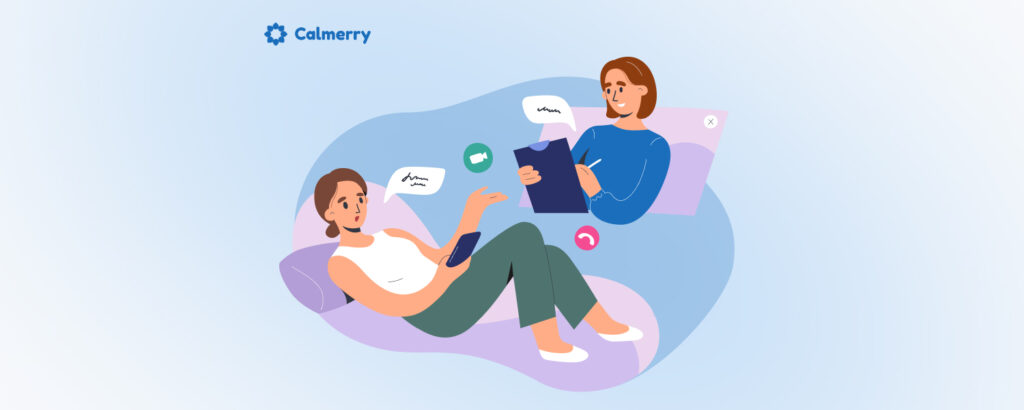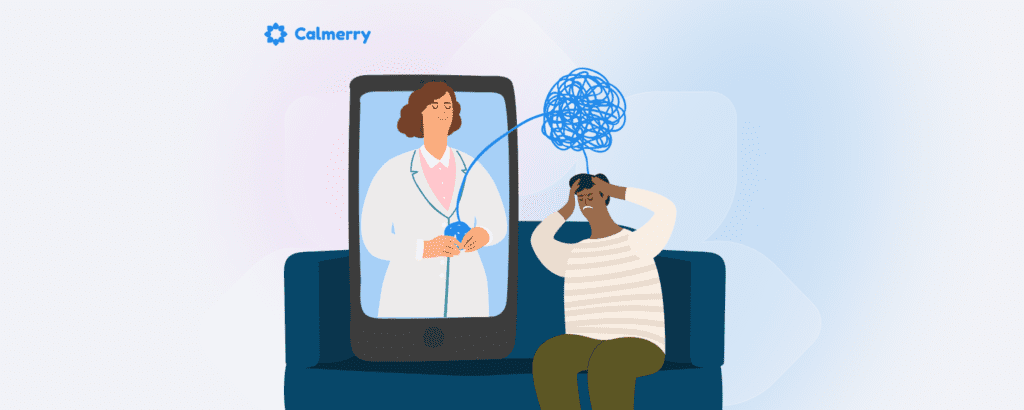
Why choose Calmerry online therapy platform?
To start therapy in the first place can seem daunting and difficult. Whether your concern is a cost, a long time appointment wait, doubts about which type of therapy you need, or just struggle to find a therapist that is right for you. All these reasons can stop you from getting the help that you need.
But even though therapy commitment could be scary and overwhelming at the beginning, it’s clinically proven that therapy is working and helping people to overcome mental health issues, establish healthy thought and behavioral patterns.
Our mission at Calmerry is to make therapy affordable and accessible for everyone, so we took care of it and created a platform designed to fit seamlessly into your life. Our services offer the flexibility to engage in therapy anytime.
We gather an extensive network of therapists and coaches licensed to work with a range of mental health issues across the US. Beyond that, we’re working hard to ensure you’ll receive exceptional virtual care. Our team vets all specialists who work on the platform. We establish high-level service protocols for all our therapists, so they can provide you with not only therapeutic help but exceptional virtual care.
Meet the best online therapy services with Calmerry
In order to find the best mental health support, it’s crucial to understand what makes online therapy effective and accessible. At Calmerry, we go beyond standard online therapy features to offer comprehensive mental health services that fit seamlessly into your daily life. Our platform stands out among many online therapy platforms by providing a complete toolkit: free self-help resources, reflection tools, mental health tests, and customized therapy plans.
Online therapy is proven to be as effective as traditional in-person sessions for many mental health concerns. Whether you’re seeking therapy for depression, couples counseling, or teen counseling, our platform connects you with experienced professionals who can help. Many people who started with therapy online report significant improvements in their mental wellbeing, comparable to traditional in-person sessions.
Get access to a licensed therapist and counseling services
The evolution of e-health showed that text-based therapy and video sessions can be highly effective. When choosing an online therapy platform, credentials matter. Our network includes the best therapists specializing in various areas – from individual counseling to couples therapy and psychiatry. All our mental health professionals are verified through health and human services boards in their respective states.
Our therapists are licensed clinical psychologists, marriage and family therapists (LMFT), clinical social workers (LCSW/LMSW), and licensed professional counselors (LPC). Each professional holds either a Master’s Degree or Doctorate in their field, ensuring high-quality therapy experience for every client.
What is online therapy, and how does it work?
Online therapy, also known as virtual therapy, provides convenient access to mental health counseling through digital platforms. Many online therapy services ensure connection with therapists via text messaging, video sessions, or live chats to address various mental health conditions such as anxiety, depression, and relationship challenges – all from the comfort of your home.
The process typically begins with a brief survey about your mental state, demographics, and preferences. This information helps telehealth platforms ensure an accurate match with a suitable therapist. All personal information is securely protected.
Most platforms then direct you to a subscription page for payment. Many work with insurance companies, allowing clients to apply for insurance coverage for therapy services. Some platforms, like Calmerry, offer free features you can explore before subscribing.
The therapist matching process varies significantly between providers, often taking several days. However, at Calmerry, clients are typically matched with a therapist within just 2 hours, allowing them to start their therapy journey sooner. Once matched, you can connect with your therapist through your chosen communication channel to discuss your concerns and establish therapy objectives.
While online therapy offers greater accessibility than traditional in-person sessions, results typically develop over 6-12 weeks, depending on individual needs and the therapeutic approach chosen. This timeline allows for meaningful progress in addressing feelings and behavioral patterns.
Is online therapy as effective as in-person therapy?
Research shows that online therapy can be as effective as in-person therapy for many mental health conditions. Multiple studies have demonstrated comparable outcomes between virtual and face-to-face therapy, particularly for common issues like anxiety, depression, and stress management.
Online therapy provides several distinct advantages that contribute to its effectiveness. Many clients appreciate the convenience of accessing care from home, which eliminates travel time and reduces associated costs. The virtual format often allows for more flexible scheduling and enhanced privacy. People in rural or underserved areas particularly benefit from improved access to mental health support. Additionally, many online therapy services offer regular messaging with therapists and digital resources that complement therapy sessions.
However, it’s important to note that online therapy may not be suitable for everyone. In-person therapy might be more appropriate for severe mental health conditions requiring intensive treatment or crisis situations needing immediate intervention. Some individuals may strongly prefer face-to-face interaction, or their specific treatment might require physical observation. Online therapy also requires reliable internet access and a private space for sessions.
The effectiveness of either format typically depends on several factors, including individual preferences, comfort with technology, the specific mental health concerns being addressed, and commitment to the therapy process. The relationship between client and therapist remains crucial in both settings.
Both online and in-person therapy require active participation and dedication to achieve meaningful results. The key is choosing the format that best aligns with your personal needs, circumstances, and comfort level.
Finding the Right Support for Your Journey
When looking to find the best online therapy match, consider your specific needs and preferences. Online therapy platforms ensure you can connect with the right professional for your situation. Whether you’re seeking individual counseling, couples therapy, or specialized support, our matching system helps you connect with a therapist who aligns with your goals.
At Calmerry, we created our platform with a clear mission: to connect those who need help with qualified professionals who can provide it. This vision emerged during the pandemic when isolation highlighted the crucial importance of accessible mental health support. Today, we continue to expand our services and ensure that quality therapy can help anyone, regardless of their location or schedule.
Insurance and Accessibility
While some online therapy platforms accept insurance, we understand that not everyone has coverage. That’s why we’ve created flexible payment options to make mental health support accessible to more people. Our therapy cost structure is transparent and designed to provide value while maintaining high-quality care.




















